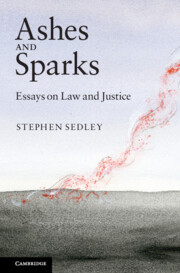Book contents
- Frontmatter
- Contents
- Preface
- Acknowledgements
- PART I History
- 1 Victors' justice
- 2 Above it all
- 3 Reading their rights
- 4 From victim to suspect
- 5 Farewell sovereignty
- 6 No law at all
- 7 The sound of silence
- 8 The spark in the ashes
- 9 Wringing out the fault
- 10 Everything and nothing
- 11 Skulls and crossbones
- PART II Law
- PART III Justice
- Index
8 - The spark in the ashes
Published online by Cambridge University Press: 05 June 2012
- Frontmatter
- Contents
- Preface
- Acknowledgements
- PART I History
- 1 Victors' justice
- 2 Above it all
- 3 Reading their rights
- 4 From victim to suspect
- 5 Farewell sovereignty
- 6 No law at all
- 7 The sound of silence
- 8 The spark in the ashes
- 9 Wringing out the fault
- 10 Everything and nothing
- 11 Skulls and crossbones
- PART II Law
- PART III Justice
- Index
Summary
Many years ago a retired solicitor, Donald Veall, who had been working his way through the law reform pamphlets contained in the Thomason Tracts in what is now the British Library, sent me the manuscript of what became a seminal work on the English civil war, The Popular Movement for Law Reform, 1640–1660. My eye was caught by some striking quotations from a writer, John Warr, of whom I knew nothing. In the years that followed I traced and, with the American historian Lawrence Kaplan, edited Warr's known writings. By chance the book, A Spark in the Ashes,was published on the day in October 1992 that I was sworn in as a High Court judge. It took its title from one of Warr's many memorable sentences: ‘There are some sparks of freedom in the minds of most, which ordinarily lie deep and are hidden in the dark as a spark in the ashes.’
This essay on the modernity of the constitutional ideas of the Levellers was presented (on DVD, with introduction and questions by videolink – recommended for those with guilty consciences about their carbon footprint) at a conference in Wellington, New Zealand, in 2007, held to mark the first appointment of a New Zealand judge – Sir Kenneth Keith – to the International Court of Justice. Since delivering the paper I have had the advantage of some valuable comments on it by Professor Keith Thomas.
- Type
- Chapter
- Information
- Ashes and SparksEssays On Law and Justice, pp. 88 - 100Publisher: Cambridge University PressPrint publication year: 2011



